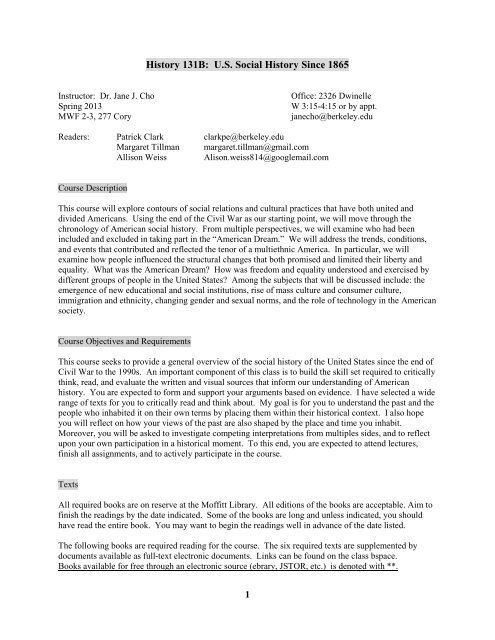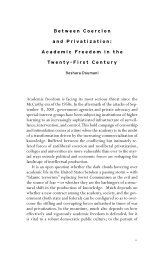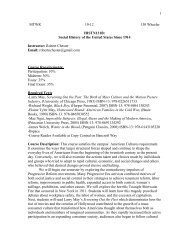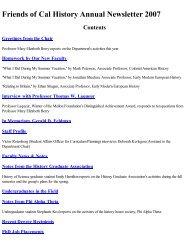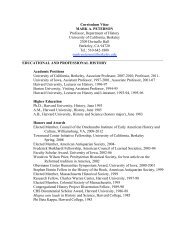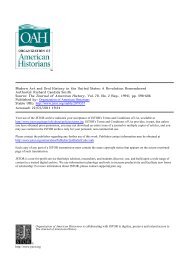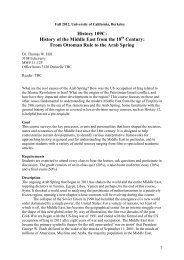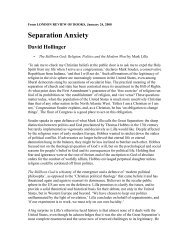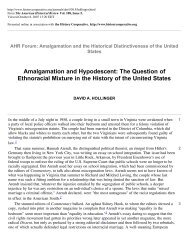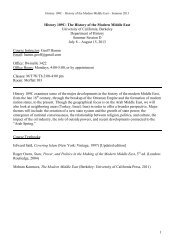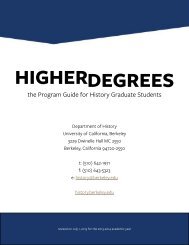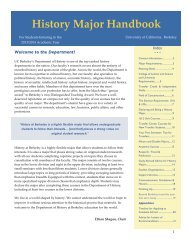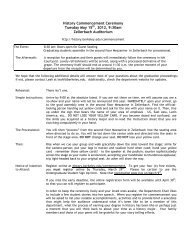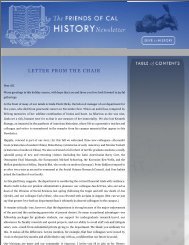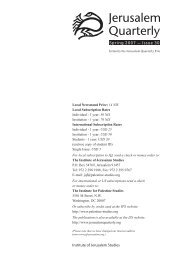131B Sp13 Syllabus.pdf - Department of History, UC Berkeley
131B Sp13 Syllabus.pdf - Department of History, UC Berkeley
131B Sp13 Syllabus.pdf - Department of History, UC Berkeley
Create successful ePaper yourself
Turn your PDF publications into a flip-book with our unique Google optimized e-Paper software.
<strong>History</strong> <strong>131B</strong>: U.S. Social <strong>History</strong> Since 1865<br />
Instructor: Dr. Jane J. Cho<br />
Spring 2013<br />
MWF 2-3, 277 Cory<br />
Office: 2326 Dwinelle<br />
W 3:15-4:15 or by appt.<br />
janecho@berkeley.edu<br />
Readers: Patrick Clark clarkpe@berkeley.edu<br />
Margaret Tillman margaret.tillman@gmail.com<br />
Allison Weiss Alison.weiss814@googlemail.com<br />
Course Description<br />
This course will explore contours <strong>of</strong> social relations and cultural practices that have both united and<br />
divided Americans. Using the end <strong>of</strong> the Civil War as our starting point, we will move through the<br />
chronology <strong>of</strong> American social history. From multiple perspectives, we will examine who had been<br />
included and excluded in taking part in the “American Dream.” We will address the trends, conditions,<br />
and events that contributed and reflected the tenor <strong>of</strong> a multiethnic America. In particular, we will<br />
examine how people influenced the structural changes that both promised and limited their liberty and<br />
equality. What was the American Dream? How was freedom and equality understood and exercised by<br />
different groups <strong>of</strong> people in the United States? Among the subjects that will be discussed include: the<br />
emergence <strong>of</strong> new educational and social institutions, rise <strong>of</strong> mass culture and consumer culture,<br />
immigration and ethnicity, changing gender and sexual norms, and the role <strong>of</strong> technology in the American<br />
society.<br />
Course Objectives and Requirements<br />
This course seeks to provide a general overview <strong>of</strong> the social history <strong>of</strong> the United States since the end <strong>of</strong><br />
Civil War to the 1990s. An important component <strong>of</strong> this class is to build the skill set required to critically<br />
think, read, and evaluate the written and visual sources that inform our understanding <strong>of</strong> American<br />
history. You are expected to form and support your arguments based on evidence. I have selected a wide<br />
range <strong>of</strong> texts for you to critically read and think about. My goal is for you to understand the past and the<br />
people who inhabited it on their own terms by placing them within their historical context. I also hope<br />
you will reflect on how your views <strong>of</strong> the past are also shaped by the place and time you inhabit.<br />
Moreover, you will be asked to investigate competing interpretations from multiples sides, and to reflect<br />
upon your own participation in a historical moment. To this end, you are expected to attend lectures,<br />
finish all assignments, and to actively participate in the course.<br />
Texts<br />
All required books are on reserve at the M<strong>of</strong>fitt Library. All editions <strong>of</strong> the books are acceptable. Aim to<br />
finish the readings by the date indicated. Some <strong>of</strong> the books are long and unless indicated, you should<br />
have read the entire book. You may want to begin the readings well in advance <strong>of</strong> the date listed.<br />
The following books are required reading for the course. The six required texts are supplemented by<br />
documents available as full-text electronic documents. Links can be found on the class bspace.<br />
Books available for free through an electronic source (ebrary, JSTOR, etc.) is denoted with **.<br />
1
Chan, Chinese American Transnationalism**<br />
Cross, All Consuming Century<br />
DeParle, An American Dream<br />
Gregory, The Southern Diaspora<br />
Lassonde, Learning to Forget **<br />
Takaki, Double Victory<br />
Optional: This class has no reader or conventional textbook, but students may find Eric Foner’s Give Me<br />
Liberty! and Alan Brinkley’s The Unfinished Nation (any edition) to be helpful.<br />
Grades<br />
30% Midterm 1 F Feb. 22<br />
30% Midterm 2 F April 5<br />
40% Final Exam M May 14, 1130-2:30pm<br />
Midterm Examination<br />
There will be two components to the midterm:<br />
40% IN-CLASS identification and significance<br />
60% TAKE-HOME open-ended question, where assigned readings must be incorporated<br />
Prompts for the take-home exam will be posted on the course bspace one week prior to the in-class<br />
midterm exam dates. You will choose one prompt and write one essay. Turn in a hard copy <strong>of</strong> your<br />
essay in class, on the listed day for the midterms.<br />
These midterm exams are not cumulative. The first midterm covers lectures 1-11, and the second covers<br />
lectures 12-23.<br />
Final Examination<br />
You will be asked to write two essays based on open-ended questions.<br />
Film<br />
We will watch two films in this course. These viewing will begin during the regularly scheduled class<br />
hour, and will extend beyond the allotted time. If prior engagement conflicts with the viewing, you can<br />
also watch the movie at the Media Resources Center in the M<strong>of</strong>fitt Library.<br />
Academic Honesty<br />
Use <strong>of</strong> material and/or ideas <strong>of</strong> others without acknowledgment is plagiarism. If you need clarification as<br />
to what constitutes plagiarism, please come see me.<br />
Notes<br />
If you need disability-related accommodations in this class, if you have emergency medical information<br />
you wish to share with me, or if you need special arrangements in case the building must be evacuated<br />
please inform me. Please see me after class or in my <strong>of</strong>fice hours.<br />
Remember to turn <strong>of</strong>f or silence your mobile phones, alarms, and other distracting devices during<br />
lectures. No recordings permitted during lectures.<br />
2
Class Schedule<br />
[Subject to change without notice.]<br />
Date Lecture Required Readings<br />
W 1/23<br />
1. Introduction<br />
F 1/25 2. American Characteristics<br />
M 1/28<br />
W 1/30<br />
3. Reconstruction: the South<br />
Optional: Leon Litwack, Been in the Storm So Long**<br />
4. Regions: the NE and the West<br />
Reading: Lassonde (chps, Intro to 3)**<br />
A NEW WAY OF LIFE<br />
F 2/1 5. Farmers/Populism<br />
M 2/4<br />
W 2/6<br />
6. Enterprise to Corporation/Industrialization<br />
Optional: Carnegie, “The Gospel <strong>of</strong> Wealth”**<br />
7. Immigration<br />
Reading: Chan (chps 1, 2, 5, 8)**<br />
F 2/8 8. Cities<br />
M 2/11<br />
W 2/13<br />
9. Cities (cont.)<br />
10. Mobility<br />
Reading: Gregory (Intro and ch. 1, 4, 5)<br />
F 2/15 11. Mass Production/Automobile<br />
M 2/18<br />
W 2/20<br />
NO LECTURE<br />
FILM: “Modern Times”<br />
F 2/22 Midterm #1<br />
INTO THE MODERN<br />
M 2/25<br />
12. WWI/Red Scare<br />
3
Optional: “Introduction” by Anthony W. Lee in Lynching Photographs by Dora Apel<br />
and Shawn Michelle Smith (<strong>Berkeley</strong>: <strong>UC</strong> Press, 2008) at<br />
http://www.ucpress.edu/content/chapters/10777.intro.<strong>pdf</strong><br />
Optional: Browse “Without Sanctuary: Photographs and Postcards <strong>of</strong> Lynching in<br />
America” at www.withoutsanctary.org<br />
W 2/27<br />
13. Roaring Twenties<br />
F 3/1 14. Intolerant Twenties<br />
Reading: Lassonde (ch. 4-6)**<br />
M 3/4<br />
W 3/6<br />
15. Great Depression<br />
Reading: Lassonde (chp 7 and Conclusion)**<br />
Browse “America from the Great Depression to World War II: Photographs from the<br />
FSA and OWI, c. 1935-1945” at http://memory.loc.gov/ammem/fsowhome.html<br />
16. New Deal<br />
F 3/8 17. WWII<br />
M 3/11<br />
W 3/13<br />
18. WWII<br />
Reading: Takaki (all)<br />
19. Nuclear Age<br />
F 3/15 20. Containing Communism Abroad<br />
M 3/18<br />
W 3/20<br />
21. Containing Communism at Home<br />
22. Race for Space and Changes in Education<br />
F 3/22 NO CLASS<br />
M 3/25 SPRING BREAK<br />
W 3/27 SPRING BREAK<br />
F 3/29 SPRING BREK<br />
M 4/1<br />
23. Civil Rights Movement<br />
Reading: Mary L. Dudziak, “Desegregation as a Cold War Imperative” in Stanford Law<br />
Review, vol. 41, no. 1 (Nov. 1988): 61-120.**<br />
Reading: Lassonde (chp 7)**<br />
Optional: Full text <strong>of</strong> speeches and sermons by Martin Luther King, Jr. can be found at<br />
http://mlk-kpp01.stanford.edu/index.php/encyclopedia/multimedia.contents<br />
W 4/3 FILM: “All the President’s Men” (1976)<br />
F 4/5 Midterm #2<br />
4
DEFINING THE “AMERICAN”<br />
M 4/8<br />
W 4/10<br />
24. Anti-War/Vietnam<br />
Optional: Sucheng Chan (ed.), The Vietnamese American 1.5 Generation: Stories <strong>of</strong> War,<br />
Revolution, Flight, and New Beginnings (Philadelphia: Temple University Press, 2006)**<br />
25. Environmentalism/Interdependence<br />
Optional: Rachel Carson, Silent Spring (any edition)<br />
F 4/12 26. The Consumer Age<br />
Reading: Cross (all)<br />
M 4/15<br />
W 4/17<br />
27. Gendered Society<br />
28. Adulthood and Communities<br />
Reading: Robert Putnam, “Bowling Alone: America’s Declining Social capital” in<br />
Journal <strong>of</strong> Democracy vol. 6, no. 1 (January 1995), 65-78. Also available at<br />
http://www.rci.rutgers.edu/~pmclean/mcleanp_01_920_01_putnam.bowling.<strong>pdf</strong><br />
Reading: Gregory (chp. 8, 9)<br />
F 4/19 29. Immigration<br />
M 4/23<br />
W 4/25<br />
30. Sexuality<br />
31. Social Welfare<br />
F 4/27 32. Working Poor/Health Care<br />
Reading: DeParle (all)<br />
M 4/30<br />
W 5/1<br />
33. Innovations<br />
34. Conclusion: An American Identity<br />
F 5/3 35. Review Session<br />
M 5/14<br />
FINAL EXAM, 11:30-2:30 pm<br />
5


